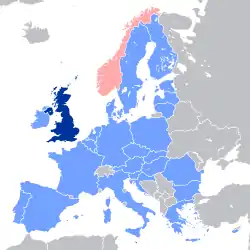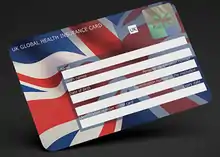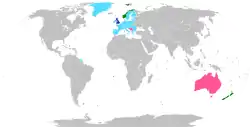UK Global Health Insurance Card
The UK Global Health Insurance Card (GHIC) is an identity card issued by the NHS Business Services Authority on behalf of the Department for Work and Pensions in the United Kingdom. It is issued free of charge to anyone covered by the social security system of the United Kingdom and provides evidence of entitlement to the provision of healthcare services under the UK's reciprocal healthcare agreement with the European Union.[1]
| UK Global Health Insurance Card | |
|---|---|
 United Kingdom Countries accepting the GHIC for access to healthcare | |
| Issued by | United Kingdom |
| First issued | 1 January 2021 |
| Purpose | Access to free or reduced cost health services in any EU member state |
| Valid in | European Union |
| Eligibility | UK residents;[lower-alpha 1] UK state pension recipients living in an EU member state |
| Cost | Free |
Before January 2021, UK residents, students and European Economic Area/Switzerland-resident UK state pension recipients were entitled to a European Health Insurance Card. Under the terms of the EU–UK Trade and Cooperation Agreement, the UK and EU agreed that reciprocal healthcare provision would continue. The UK launched the Global Health Insurance Card in January 2021 to partially replace the EHIC for this purpose. The UK continues to accept the EU's EHIC and issue EHIC cards to certain individuals who maintain entitlement under previous treaties with the EEA and Switzerland.[2]
Because similar reciprocal healthcare agreements have not yet been formed between the UK and the non-EU EHIC participants, the GHIC is not currently valid in Norway, Iceland, Liechtenstein or Switzerland.[3] However, the UK is currently negotiating arrangements with these countries,[4][5] and British citizens can continue to receive reciprocal care in Norway with only their passport.[6][7]
Like the EHIC, the GHIC only covers healthcare which is normally covered by a statutory health care system in the visited country, so the UK government still advises travellers to purchase travel insurance.[4]
Background
The UK and European Union have a long history of reciprocal healthcare agreements. The UK's National Health Service was one of the first universal healthcare systems established anywhere in the world, influencing British dominions such as Australia who then formed reciprocal agreements for their citizens to receive treatment.[8] The European Economic Community (EEC) also agreed in 1971 that members should provide social security services including healthcare to each other's residents, and the UK joined the EEC in 1973.[9]
Entitlement to healthcare in the EEC and later EU is based on residence rather than citizenship, so a passport or national identity card is not sufficient evidence to prove entitlement to reciprocal care. For this reason, the European Commission made the decision in 2003 to create the European Health Insurance Card. As an EU member state, the UK issued this card to all entitled persons between 2004 and 2020. However, in 2020, the UK withdrew from the European Union, meaning that reciprocal healthcare elements of the EU and associated treaties with the EEA and Switzerland ceased to apply to the UK. Initial withdrawal agreements with those respective parties included some provision to continue to recognise EHIC cards for individuals with an entitlement pre-dating the UK's withdrawal from the European Single Market.
In December 2020, the UK and EU concluded the EU–UK Trade and Cooperation Agreement, which allowed for continued healthcare reciprocity and acceptance of EU-issued EHIC cards. The UK opted to begin issuing its own identity card as evidence for individuals covered by the UK system.[10] The intention is that this new "Global Health Insurance Card" will ultimately be used not only for European reciprocal care, but also reciprocal care agreements with other countries that the UK signs treaties with.[2]
Appearance

The appearance of the UK Global Health Insurance Card is derived from the previously issued European Health Insurance Card to facilitate ease of acceptance within the EU.[11] All EHIC fields used on the UK-issued EHIC have been carried over in the same format, however the field numbering system of the EHIC common model have been removed. Fields include:
- Name (family names)
- Given names
- Date of birth
- Personal identification number (a number that remains consistent across all UK EHICs and GHICs issued to an individual)
- Identification number of the issuing institution (usually 0001 for the Department for Work and Pensions)
- Identification number of the card (a number unique to each GHIC issued)
The background of the card consists of a British union flag design and a hologram is fixed on the upper right corner. Where the applicant lives in Northern Ireland, the card can optionally be issued with a plain blue background.[12]
A provisional paper GHIC can also be issued by the UK in urgent circumstances provided that it is signed and sealed by a relevant UK government institution.[11]
Eligibility
Eligibility for the GHIC
Those eligible for a GHIC include:[1]
- British and Irish citizens habitually resident in the UK;
- All other citizens resident in the UK with valid leave to remain;
- Recipients of a UK state pension living in the EU;
- Students normally resident in the UK but currently undertaking study or a work placement in the EU;
- Workers normally resident in the UK but temporarily posted abroad by their employer.
Anyone with a currently valid UK-issued EHIC does not need to apply for a GHIC until it expires.[1]
Eligibility for a UK-issued EHIC
Those who remain eligible for a UK-issued EHIC include:[3]
- EU, Swiss, Norwegian, Icelandic or Liechtenstein citizens living in the UK since before 1 January 2021 (and their dependents);
- Recipients of a UK state pension living in the EU registered on form S1 or E121 (and their dependents);
- Frontier workers working across the UK border since before 1 January 2021 and registered on form S1 or E106 (and their dependents);
- Workers normally resident in the UK but temporarily posted abroad by their employer in the EU, Switzerland, Norway, Iceland or Liechtenstein since before 1 January 2021 (and their dependents);
- Students normally resident in the UK but currently undertaking study or a work placement in the EU, Switzerland, Norway, Iceland or Liechtenstein since before 1 January 2021.
Future Expansion

The UK also has reciprocal healthcare agreements with Australia, Bosnia and Herzegovina, Kosovo, North Macedonia, Montenegro, New Zealand, Serbia, the British Crown Dependencies of the Isle of Man and Jersey and the British Overseas Territories of Anguilla, the British Virgin Islands, the Falkland Islands, Gibraltar, Montserrat, Saint Helena and the Turks and Caicos Islands.[13]
At the moment, the GHIC is not officially recognised by these jurisdictions, and the eligibility rules for each of these agreements may differ from GHIC eligibility.[4] The scope of treatment offered may also differ from that in the UK-EU agreement.[13] It is yet to be seen whether the UK government intends to alter any of these agreements to bring them under the GHIC programme.
Notes
- Includes UK resident students studying or on placement in the EU.
References
- "Apply for a free GHIC card - Healthcare abroad". www.ghic.org.uk. NHS Business Services Authority. 15 August 2018. Retrieved 10 January 2021.
- "Everything we know about the new Ghic health insurance card". The Independent. 3 January 2021. Retrieved 10 January 2021.
- "Apply for a free European Health Insurance Card (EHIC)". nhs.uk. NHS Business Services Authority. 11 January 2021.
- "UK launches Global Health Insurance Card". GOV.UK. Department of Health and Social Care. Retrieved 11 January 2021.
- "Apply for a UK Global Health Insurance Card (GHIC)". GOV.UK. Government of the United Kingdom. Retrieved 22 January 2021.
- https://www.legislation.gov.uk/uksi/2020/1597/contents/made
- "Avtale i form av brevveksling om fortsatt anvendelse og endring av avtale om sosial trygd mellom Norge og Storbritannia av 19. juni 1990, som endret ved avtale av 5. november 1992, og tilhørende proto.. - Lovdata". lovdata.no. Retrieved 2021-01-27.
- Britnell, Mark (2015). In Search of the Perfect Health System. London: Palgrave. p. 3. ISBN 978-1-137-49661-4.
- "Cross-border Health Care in the European Union" (PDF). European Observatory on Public Health Systems and Policies. Retrieved 10 January 2021.
- "UK–EU Trade and Cooperation Agreement" (PDF). gov.uk. Retrieved 29 December 2020.
- "Trade and Cooperation Agreement Between the European Union and the European Atomic Energy Community, of the One Part, and the United Kingdom of Great Britain and Northern Ireland, of the Other Part" (PDF). Government of the United Kingdom. Retrieved 22 January 2021.
- "'Global Health Insurance Card' launched". The Independent. 11 January 2021. Retrieved 11 January 2021.
- "Reciprocal healthcare between the UK and the EU" (PDF). British Medical Association. Retrieved 10 January 2021.